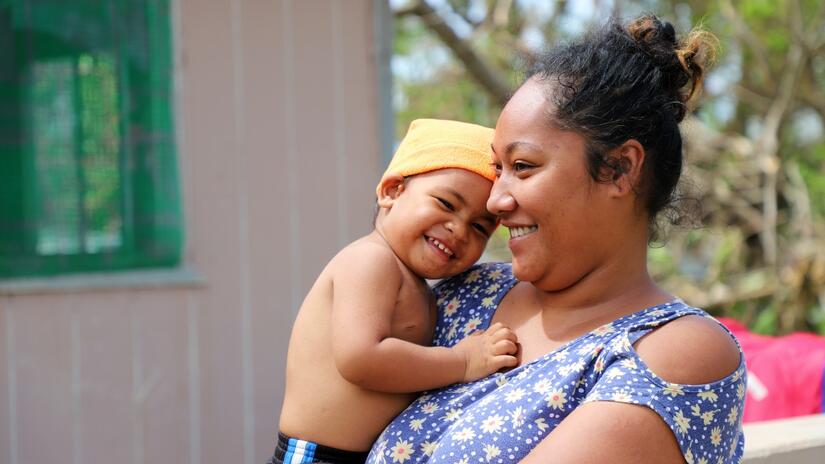The Fund
The Empress Shôken Fund is named after Her Majesty the Empress of Japan, who proposed – at the 9th International Conference of the Red Cross – the creation of an international fund to promote relief work in peacetime. It is administered by the Joint Commission of the International Federation of Red Cross and Red Crescent Societies and the International Committee of the Red Cross, which maintains close contact with the Japanese Permanent Mission in Geneva, the Japanese Red Cross Society and the Meiji Jingu Research Institute in Japan.
The Fund has a total value of over 16 million Swiss francs and supports projects run by National Red Cross and Red Crescent Societies to benefit their communities in various ways. The first grant was awarded in 1921, to help five European National Societies fight the spread of tuberculosis. The Fund has assisted more than 160 National Societies thus far.
The imperial family, the Japanese government, the Japanese Red Cross and the Japanese people revere the memory of Her Majesty Empress Shôken, and their enduring regard for the Fund is shown by the regularity of their contributions to it.
The grants are usually announced every year on 11 April, the anniversary of her death. This year the announcement is being published earlier owing to the Easter holidays.
The selection process
The Empress Shôken Fund received 36 applications in 2020, covering a diverse range of humanitarian projects run by National Societies in every region of the world. This year the Joint Commission agreed to allocate a total of 400,160 Swiss francs to 14 projects in Argentina, Bulgaria, Greece, Iraq, Lithuania, Montenegro, Namibia, Palestine, Panama, Sierra Leone, Timor-Leste, Tonga, Trinidad and Tobago, and Uganda.
The projects to be supported in 2020 cover a number of themes, including first aid, youth engagement and disaster preparedness. Moreover, nearly all of the selected projects seek to strengthen the volunteer base of National Societies, with a view to building on the unique role played by the International Red Cross and Red Crescent Movement in communities everywhere. The Fund encourages new and innovative approaches that are geared towards learning, so that the broader Movement can benefit from project findings.
The 2020 grants
The Argentine Red Cross has launched a generational change in its leadership by promoting volunteers’ access to decision-making bodies. It will use the grant to design and build virtual courses, creating new spaces for dialogue and debate.
For years, the Bulgarian Red Cross has been a major partner of the State in the field of first aid, helping it to respond effectively in a crisis. The National Society will use the grant to reinforce its leadership position by introducing an online first-aid training platform that will facilitate theoretical learning and increase the number of trained first-aiders.
The Hellenic Red Cross seeks to empower local communities in vulnerable or isolated areas. The grant will go towards establishing branch and community disaster teams that will build communities’ resilience through activities and training around disaster risk reduction.
In Iraq, late detection of breast cancer is common and makes the disease much deadlier. To save women’s lives, the Iraqi Red Crescent Society will use the grant to train female volunteers who will raise awareness of early detection methods for breast cancer.
The Lithuanian Red Cross will put the grant towards an innovative digital platform for evaluating the impact of its first-aid courses, issuing and tracking certifications, and connecting with first-aiders after they complete their training.
Young people account for more than 80% of the volunteers of the Red Cross of Montenegro. The National Society will use the grant to improve its activities and services with the aim of strengthening youth participation and raising awareness of volunteer opportunities.
As Namibia’s population grows, first-aid skills and services are more in demand than ever before. The grant will enable the Namibia Red Cross to run intensive first-aid training and certification courses in ten schools.
To better serve the communities it works with, the Palestine Red Crescent Society seeks to build its staff members’ and volunteers’ capacities. It will use the grant to establish a computer lab as a continuing-education unit for all of its staff and volunteers.
In Panama, gang violence has shot up in recent years, and pollution continues to grow owing to a lack of public awareness. The Red Cross Society of Panama will use the grant to develop a series of activities aimed at promoting a culture of peace and environmental responsibility.
Blood transfusion services are an essential component of Sierra Leone’s health-care system. The grant will enable the Sierra Leone Red Cross Society to increase access to safe blood products, especially for pregnant woman and infants.
In Timor-Leste, 70% of the population is under 30 years old, but accessing information about reproductive health can be difficult, particularly in rural areas. The Timor Leste Red Cross will use the grant for a public-awareness and education campaign for young people on reproductive health.
The Tonga Red Cross Society will use the grant to improve students' access to health care and physical activity by using safer vehicles for transportation.
The Trinidad and Tobago Red Cross Society is exploring novel approaches to teaching disaster preparedness and increasing public awareness on the subject. The grant will enable the National Society to use virtual-reality technology to teach the public about the reality and impact of disasters.
In Uganda, 70% of blood donors are students, so the country faces blood shortages outside term time. The Uganda Red Cross Society will use the grant to develop its online recruitment of adult blood donors so as to counteract any seasonal shortfalls during the holidays.

